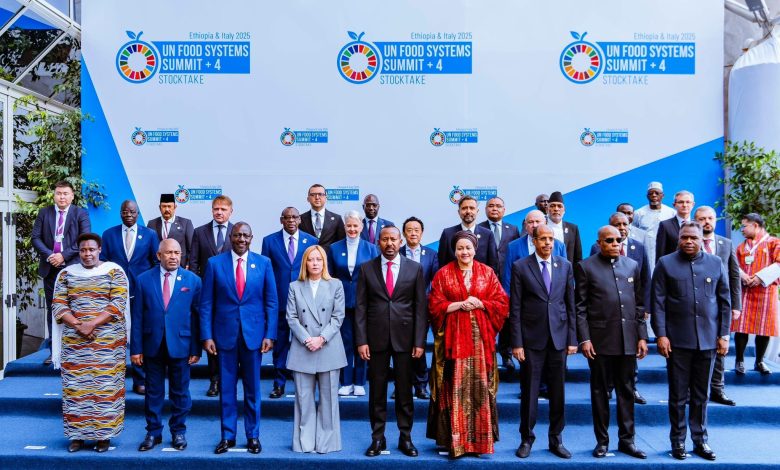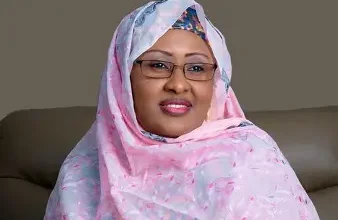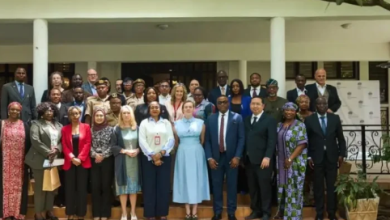Lead
UN Food Systems Summit: Leaders urge action to address global hunger

The United Nations Food Systems Summit Stocktake (UNFSS+4) has brought together global leaders to address the pressing issue of food insecurity.
Vice President Kashim Shettima, representing Nigeria, emphasised the need for collective action and shared purpose to combat food insecurity on the continent and globally.
Shettima noted that food insecurity has become a shared affliction that requires African nations to work together to address the challenge.
According to them, Africa needs predictable concession finance to invest in agriculture, rural transformation, infrastructure and literacy, while climate finance must be aligned with the food system.
The appeal came as Vice President Kashim Shettima said Nigeria was scaling its agricultural drive with modern technology, such as Artificial Intelligence (AI), geospatial analytics, and satellite-driven climate intelligence to end food insecurity in the country.
In a related development, European Union (EU) denied a claim by Doctors Without Borders/Médecins Sans Frontières (MSF) that Northern Nigeria was witnessing alarming malnutrition crisis due to shrinking funding from international donor agencies.
Country Representative of MSF in Nigeria, Ahmed Aldikhari was quoted in a statement issued last week by MSF, to have said, “The year 2024 marked a turning point in northern Nigeria’s nutritional crisis, with an increase of 25 percent from the previous year.
“But the true scale of the crisis exceeds all predictions. We are currently witnessing massive budget cuts, particularly from the United States, the United Kingdom, and the European Union, which are having a real impact on the treatment of malnourished children.”
Shettima, who joined other African leaders on Monday at the opening session of the United Nations Food Systems Summit Stocktake (UNFSS+4) in Addis Ababa, said the target was to ensure a future anchored on abundance, equity, and human dignity.
According to him, while food insecurity has now become a shared affliction that is no longer taking cover in distant lands, African nations must learn to swim against the tide, amid climate change and other global challenges.
He said, “The Fourth Industrial Revolution has not only disrupted the old order but gifted us instruments that were once confined to the imagination. Artificial intelligence, geospatial analytics, and satellite-driven climate intelligence are now part of our agricultural vocabulary.
“We are deploying these tools to monitor production, enhance transparency, connect producers to markets, and reduce waste across the value chain.”
Instead of diplomatic pleasantries, Shettima urged participants at the summit to leave the event with a conviction that Africa will succeed. He advised African countries to rise with a shared purpose and determination to make the continent food secure.
Shettima said, “a broken food system in any part of the world diminishes the dignity of humanity as a whole. Let us rise with a shared purpose.
”Let us build a world where no child sleeps on an empty stomach, where no farmer is forgotten, and where food is not a luxury but a human right.”
The vice president said that Nigeria had also pursued institutional reforms robustly, including deepening partnerships across sectors and prioritising agro-industrialisation as a key driver of inclusive growth.
He said this followed the unveiling of the National Food Systems Transformation Pathway, leading to the rollout of targeted investments in infrastructure and human capacity.
Shettima also said that the declaration of a national emergency on food security in Nigeria did not just amount to raising the alarm,
“It’s the reason we are advancing the Presidential Initiative on Food Security, a mission designed to upscale the cultivation of vital staples maize, rice, cassava, and wheat.
“We are backing this with climate-smart innovations, financial inclusion for smallholder farmers, and an expansion of extension services, particularly for women and youth, ” he said.
The vice president outlined other investments in agriculture to include the Special Agro-Industrial Processing Zones.
He noted that the zones being developed in partnership with the African Development Bank and IFAD were not just places of production but also engines of transformation.
“They are creating jobs, attracting private capital, and linking rural producers to national and global markets.
‘:Our faith in the capacity of our people remains unshaken. But production is not enough. We believe that a sustainable food system must also be a healthy one, ” he added.
Shettima extended the warmest gratitude of President Bola Tinubu and the people of Nigeria to the host countries, Ethiopia and Italy, assured that, apart from just listening and learning, Nigeria was fully ready to lead in areas where leadership is needed.
“Nigeria is ready to listen. Nigeria is ready to learn. Nigeria is ready to lead wherever leadership is required.
”We are here to champion food systems that are resilient in the face of climate shocks, responsive to nutritional needs, and rooted in local realities.
”We are here because we believe that the arc of history does not only bend towards justice. It bends towards food justice, ” he said.
Prime Minister of Ethiopia, Dr. Abiy Ahmed, described the summit as a moment to take stock and renew a shared commitment to building food systems that are resilient and inclusive.
Ahmed said that Africa needed predictable concession finance to invest in agriculture, rural transformation, infrastructure and literacy, saying that climate finance must be aligned with the food system, “because hunger and environmental degradation are deeply linked”.
According to him, since the first food system summit in 2021, Ethiopia has launched a comprehensive roadmap for food system transformation.
The Ethiopian prime minister said, “Globally, food systems are facing immense pressure from planning stock, shocks, conflicts, inequalities and economic destruction.
”At the same time, development assistance has declined in multilateral cooperation. These challenges threatened production, supply and dignity in the sub-region nations.
“Yet, in this context, the human spirit and our shared resolve to act remain strong. In Ethiopia, we have made a deliberate choice to act boldly, to think holistically and to place human dignity at the centre of our food system transformation.
“We are investing in local production, reducing dependency on imports and building a resilient system that serves our people and our future.”
Secretary-General of the United Nations, António Guterres, who spoke via a recorded video cast, said that food systems involved more than food, saying they include climate, justice and the right to a better future.
Guterres said, “Since the last food summit, we have seen progress. We are committed to food systems that are inclusive, sustainable, equitable, resilient and built on human rights, but progress is not fair enough. Global hunger is rising, and threats, shocks are pushing the prices of food.
“The Gross Domestic Product (GDP) of the African continent is not just a crisis of scarcity, it is a crisis of justice, equity and climate. Climate change is destroying harvests, supply chains and humanitarian response.”
Meanwhile, a statement on Monday by European Union denying the alleged scaling down of its humanitarian assistance to Nigeria said, “following a press release published on 25 July by the non-governmental organisation MSF (Médecins Sans Frontières (Doctors Without Borders), mentioning alleged ‘massive cuts’ by the European Union (EU), among other international donors, in the response to the nutrition insecurity in Nigeria, the EU Delegation in Nigeria would like to communicate that this information is unsubstantiated and inaccurate.
“The level of EU humanitarian support granted by the EU Civil Protection and Humanitarian Office ECHO in Nigeria in the first half of 2025 has in fact been similar to the one provided in the first half of 2024 and, as done in previous years, the EU is working to increase the amount with additional top ups.”
The statement added, “Like in 2024, a significant part of ECHO assistance in Nigeria focuses on nutrition, health and food assistance emergency.”
It stressed, “The EU Delegation takes note of the revised version of the press release published today by MSF, which eliminates the mention of the European Union when speaking of massive cuts by international donors.
“While commending the work performed by MSF teams, partly through EU funding, to help malnourished children and their mothers in Nigeria, as witnessed by the EU Ambassador during his recent visit to Sokoto State on 19-20 July, the EU Delegation underlines the importance of communicating verified and accurate information on this matter of utmost importance for the Nigerian people.
“It reiterates the call launched by the EU Ambassador, during his 22 July joint press conference with the Honourable Minister for Humanitarian Affairs and Poverty Reduction as well as humanitarian partners to urgently enhance resources from domestic and international sources to address the emergency nutrition situation particularly in North-West and North-East Nigeria.
“The EU Delegation wishes once more to highlight that the EU is keeping its financial commitments and its general level of support across the board in the framework of its partnership with Nigeria.”



